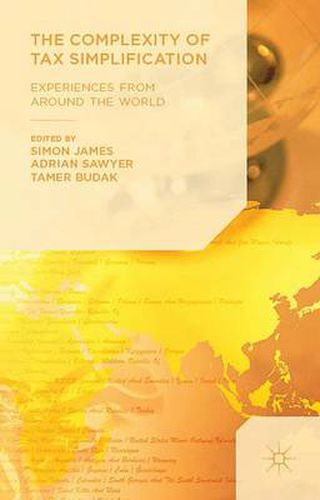Readings Newsletter
Become a Readings Member to make your shopping experience even easier.
Sign in or sign up for free!
You’re not far away from qualifying for FREE standard shipping within Australia
You’ve qualified for FREE standard shipping within Australia
The cart is loading…






This title is printed to order. This book may have been self-published. If so, we cannot guarantee the quality of the content. In the main most books will have gone through the editing process however some may not. We therefore suggest that you be aware of this before ordering this book. If in doubt check either the author or publisher’s details as we are unable to accept any returns unless they are faulty. Please contact us if you have any questions.
Simplicity in taxation has considerable potential advantages. However, attempts to simplify tax systems are only likely to be successful and enduring if they take account of the reasons why taxation is complex. There are strong pressures on tax systems to accommodate a range of important factors, as well as complex and changing national and international environments within which modern tax systems have to operate.
This book explores the experiences of simplification in a range of countries and jurisdictions. The authors analyse a range of manifestations of simplification, including tax systems, tax law, taxpayer communications and tax administration. They also review the longer term or more fundamental approaches to simplification, suggesting that in order to strike the optimum balance between simplicity and the aims of a tax system in terms of efficiency and equity, a range of complex environmental factors must all be taken into account. With chapters reflecting on experiences from Australia, China, Canada, Malaysia, New Zealand, Russia, South Africa, Thailand, Turkey, the UK and the US, the authors illustrate differences between jurisdictions and the changing environment in which they operate.
This book addresses the crucial balance between simplicity and the other objectives of tax design and reform, and suggests that reformers of the tax system should include simplicity as one of the key evaluators of any design or reform proposal.
$9.00 standard shipping within Australia
FREE standard shipping within Australia for orders over $100.00
Express & International shipping calculated at checkout
This title is printed to order. This book may have been self-published. If so, we cannot guarantee the quality of the content. In the main most books will have gone through the editing process however some may not. We therefore suggest that you be aware of this before ordering this book. If in doubt check either the author or publisher’s details as we are unable to accept any returns unless they are faulty. Please contact us if you have any questions.
Simplicity in taxation has considerable potential advantages. However, attempts to simplify tax systems are only likely to be successful and enduring if they take account of the reasons why taxation is complex. There are strong pressures on tax systems to accommodate a range of important factors, as well as complex and changing national and international environments within which modern tax systems have to operate.
This book explores the experiences of simplification in a range of countries and jurisdictions. The authors analyse a range of manifestations of simplification, including tax systems, tax law, taxpayer communications and tax administration. They also review the longer term or more fundamental approaches to simplification, suggesting that in order to strike the optimum balance between simplicity and the aims of a tax system in terms of efficiency and equity, a range of complex environmental factors must all be taken into account. With chapters reflecting on experiences from Australia, China, Canada, Malaysia, New Zealand, Russia, South Africa, Thailand, Turkey, the UK and the US, the authors illustrate differences between jurisdictions and the changing environment in which they operate.
This book addresses the crucial balance between simplicity and the other objectives of tax design and reform, and suggests that reformers of the tax system should include simplicity as one of the key evaluators of any design or reform proposal.